Literature Review on Corporate Social Responsibility: An Analysis
VerifiedAdded on 2020/11/12
|9
|2562
|56
Report
AI Summary
This report provides a comprehensive literature review on Corporate Social Responsibility (CSR), examining its definition, objectives, and impact. The review analyzes six articles, defining CSR as both a summary and explanation of complete knowledge found in books and articles. It explores CSR's importance in the current globalized world, its four stages of development (economic, legal, philanthropic, and ethical), and the role of stakeholder theory. The report highlights CSR's objectives, including conducting surveys, synthesizing information, critically analyzing data, and organizing research. The review discusses the importance of CSR for brand image, profitability, and community development, along with the role of governments and the evolution of CSR practices. The conclusion emphasizes CSR's growing significance in business operations and its impact on stakeholders and the community.

LITERATURE REVIEW
Paraphrase This Document
Need a fresh take? Get an instant paraphrase of this document with our AI Paraphraser
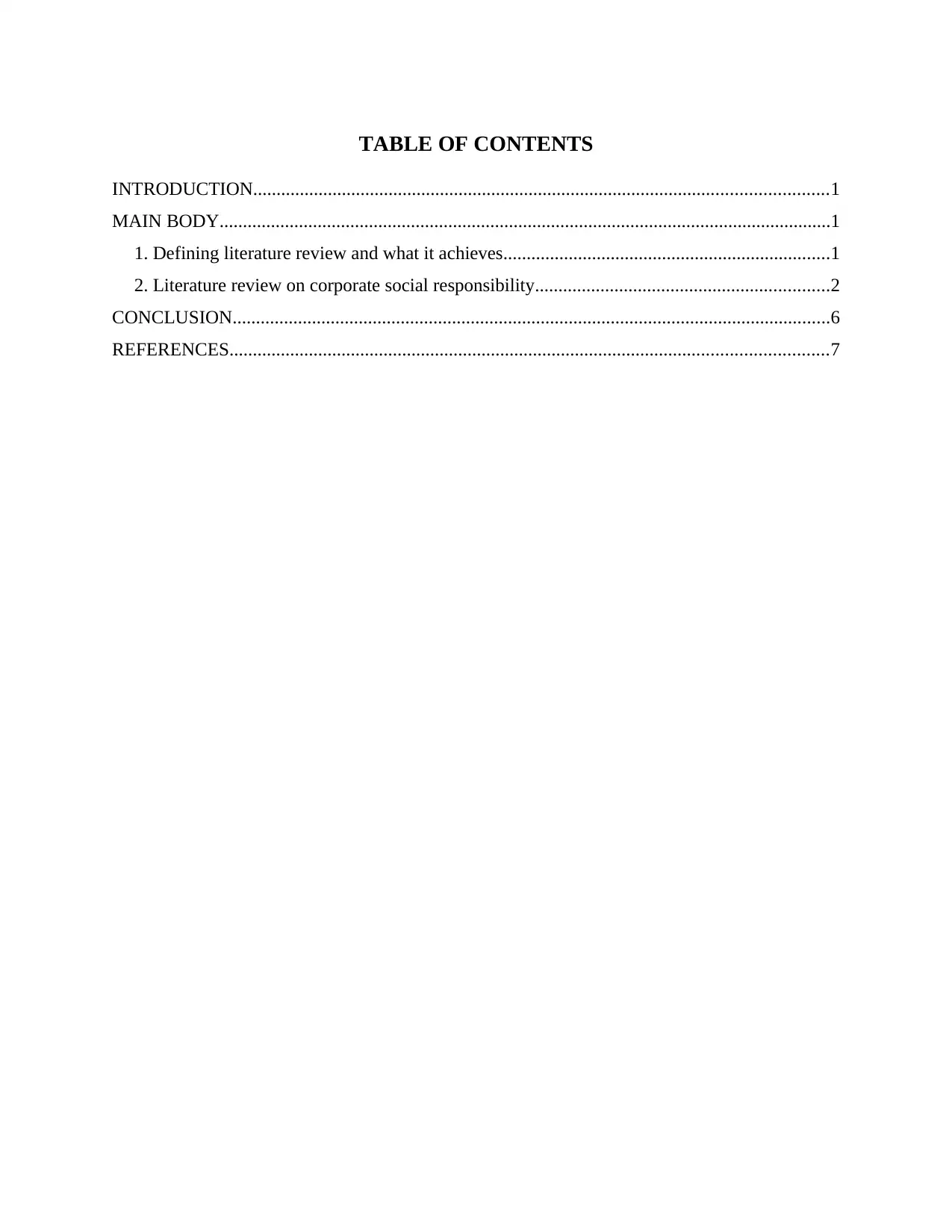
TABLE OF CONTENTS
INTRODUCTION...........................................................................................................................1
MAIN BODY...................................................................................................................................1
1. Defining literature review and what it achieves......................................................................1
2. Literature review on corporate social responsibility...............................................................2
CONCLUSION................................................................................................................................6
REFERENCES................................................................................................................................7
INTRODUCTION...........................................................................................................................1
MAIN BODY...................................................................................................................................1
1. Defining literature review and what it achieves......................................................................1
2. Literature review on corporate social responsibility...............................................................2
CONCLUSION................................................................................................................................6
REFERENCES................................................................................................................................7
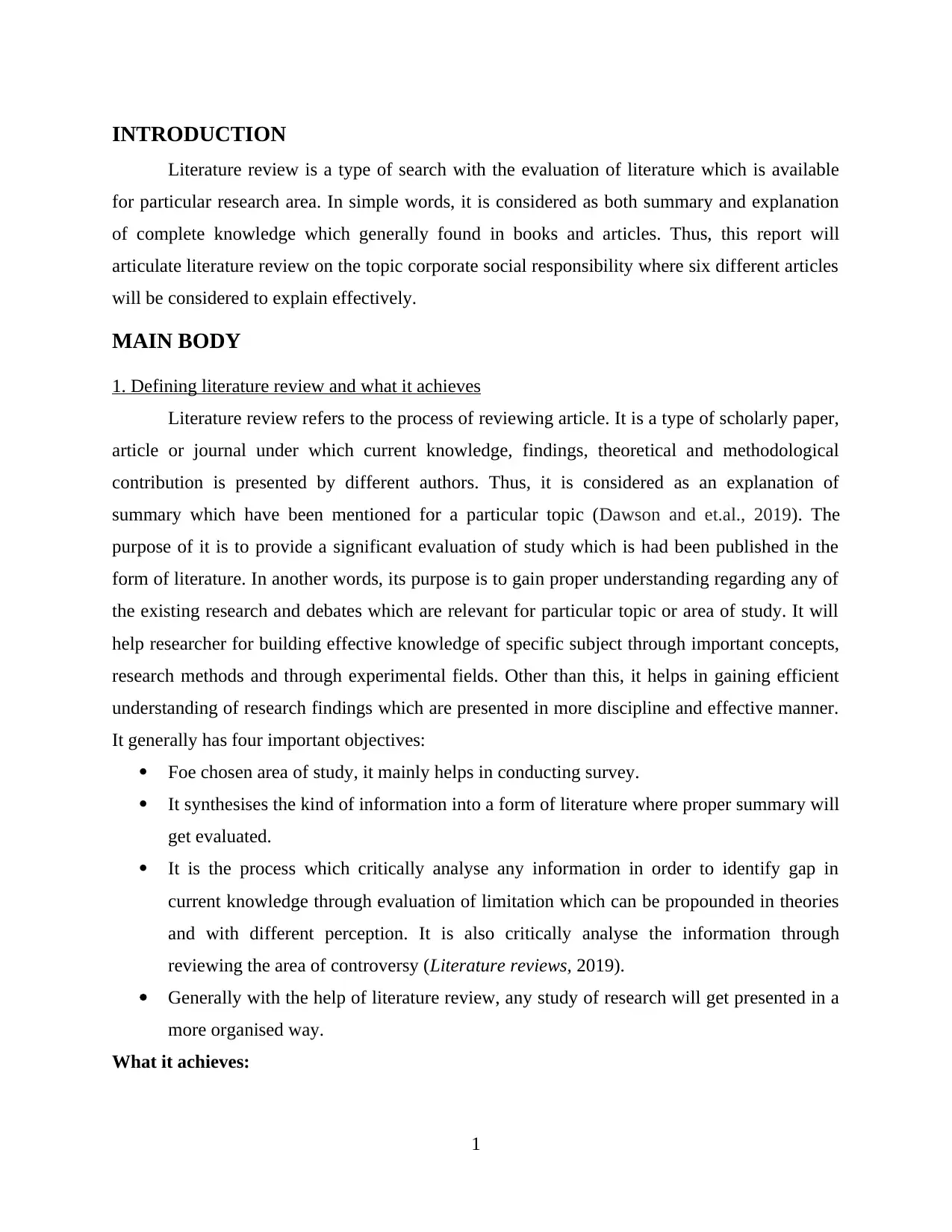
INTRODUCTION
Literature review is a type of search with the evaluation of literature which is available
for particular research area. In simple words, it is considered as both summary and explanation
of complete knowledge which generally found in books and articles. Thus, this report will
articulate literature review on the topic corporate social responsibility where six different articles
will be considered to explain effectively.
MAIN BODY
1. Defining literature review and what it achieves
Literature review refers to the process of reviewing article. It is a type of scholarly paper,
article or journal under which current knowledge, findings, theoretical and methodological
contribution is presented by different authors. Thus, it is considered as an explanation of
summary which have been mentioned for a particular topic (Dawson and et.al., 2019). The
purpose of it is to provide a significant evaluation of study which is had been published in the
form of literature. In another words, its purpose is to gain proper understanding regarding any of
the existing research and debates which are relevant for particular topic or area of study. It will
help researcher for building effective knowledge of specific subject through important concepts,
research methods and through experimental fields. Other than this, it helps in gaining efficient
understanding of research findings which are presented in more discipline and effective manner.
It generally has four important objectives:
Foe chosen area of study, it mainly helps in conducting survey.
It synthesises the kind of information into a form of literature where proper summary will
get evaluated.
It is the process which critically analyse any information in order to identify gap in
current knowledge through evaluation of limitation which can be propounded in theories
and with different perception. It is also critically analyse the information through
reviewing the area of controversy (Literature reviews, 2019).
Generally with the help of literature review, any study of research will get presented in a
more organised way.
What it achieves:
1
Literature review is a type of search with the evaluation of literature which is available
for particular research area. In simple words, it is considered as both summary and explanation
of complete knowledge which generally found in books and articles. Thus, this report will
articulate literature review on the topic corporate social responsibility where six different articles
will be considered to explain effectively.
MAIN BODY
1. Defining literature review and what it achieves
Literature review refers to the process of reviewing article. It is a type of scholarly paper,
article or journal under which current knowledge, findings, theoretical and methodological
contribution is presented by different authors. Thus, it is considered as an explanation of
summary which have been mentioned for a particular topic (Dawson and et.al., 2019). The
purpose of it is to provide a significant evaluation of study which is had been published in the
form of literature. In another words, its purpose is to gain proper understanding regarding any of
the existing research and debates which are relevant for particular topic or area of study. It will
help researcher for building effective knowledge of specific subject through important concepts,
research methods and through experimental fields. Other than this, it helps in gaining efficient
understanding of research findings which are presented in more discipline and effective manner.
It generally has four important objectives:
Foe chosen area of study, it mainly helps in conducting survey.
It synthesises the kind of information into a form of literature where proper summary will
get evaluated.
It is the process which critically analyse any information in order to identify gap in
current knowledge through evaluation of limitation which can be propounded in theories
and with different perception. It is also critically analyse the information through
reviewing the area of controversy (Literature reviews, 2019).
Generally with the help of literature review, any study of research will get presented in a
more organised way.
What it achieves:
1
⊘ This is a preview!⊘
Do you want full access?
Subscribe today to unlock all pages.

Trusted by 1+ million students worldwide
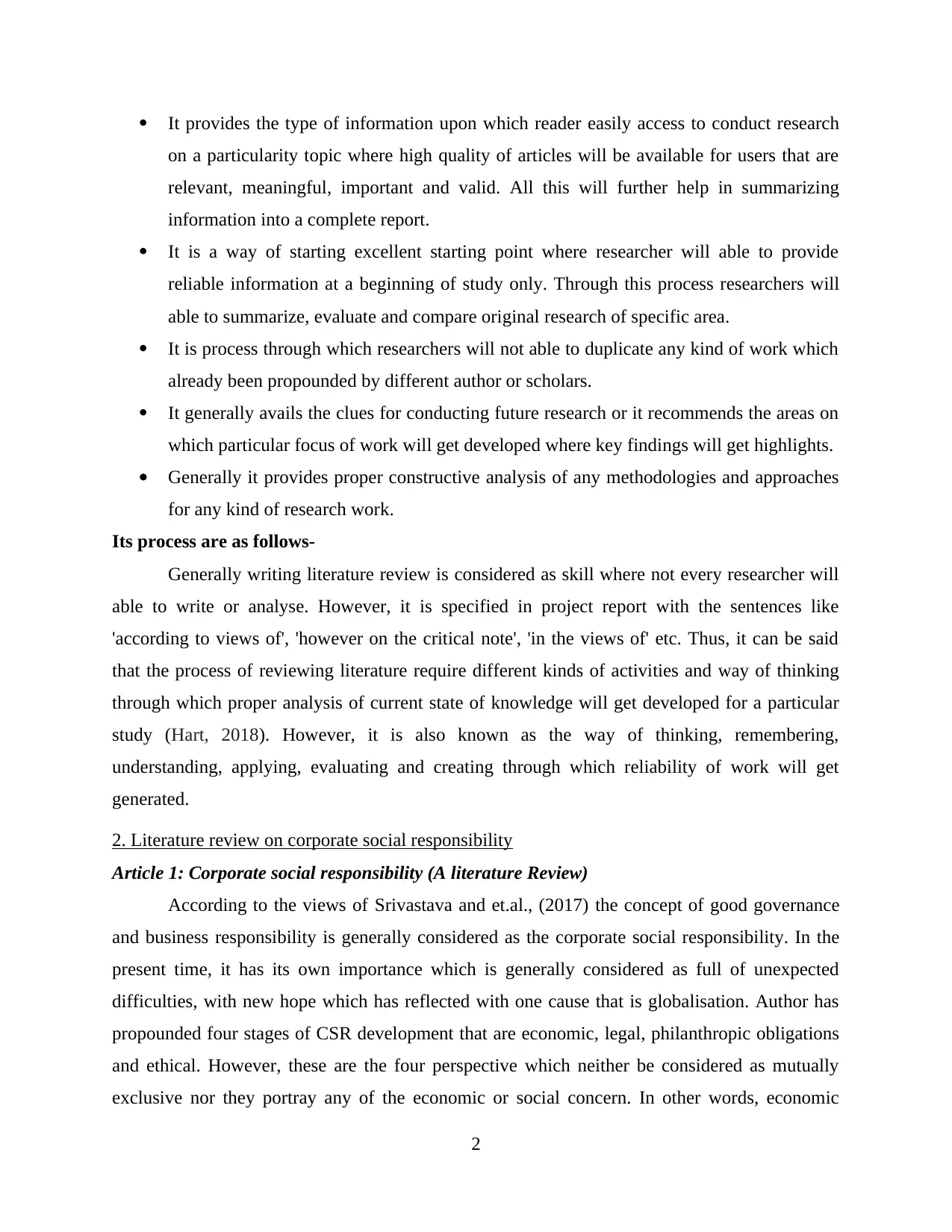
It provides the type of information upon which reader easily access to conduct research
on a particularity topic where high quality of articles will be available for users that are
relevant, meaningful, important and valid. All this will further help in summarizing
information into a complete report.
It is a way of starting excellent starting point where researcher will able to provide
reliable information at a beginning of study only. Through this process researchers will
able to summarize, evaluate and compare original research of specific area.
It is process through which researchers will not able to duplicate any kind of work which
already been propounded by different author or scholars.
It generally avails the clues for conducting future research or it recommends the areas on
which particular focus of work will get developed where key findings will get highlights.
Generally it provides proper constructive analysis of any methodologies and approaches
for any kind of research work.
Its process are as follows-
Generally writing literature review is considered as skill where not every researcher will
able to write or analyse. However, it is specified in project report with the sentences like
'according to views of', 'however on the critical note', 'in the views of' etc. Thus, it can be said
that the process of reviewing literature require different kinds of activities and way of thinking
through which proper analysis of current state of knowledge will get developed for a particular
study (Hart, 2018). However, it is also known as the way of thinking, remembering,
understanding, applying, evaluating and creating through which reliability of work will get
generated.
2. Literature review on corporate social responsibility
Article 1: Corporate social responsibility (A literature Review)
According to the views of Srivastava and et.al., (2017) the concept of good governance
and business responsibility is generally considered as the corporate social responsibility. In the
present time, it has its own importance which is generally considered as full of unexpected
difficulties, with new hope which has reflected with one cause that is globalisation. Author has
propounded four stages of CSR development that are economic, legal, philanthropic obligations
and ethical. However, these are the four perspective which neither be considered as mutually
exclusive nor they portray any of the economic or social concern. In other words, economic
2
on a particularity topic where high quality of articles will be available for users that are
relevant, meaningful, important and valid. All this will further help in summarizing
information into a complete report.
It is a way of starting excellent starting point where researcher will able to provide
reliable information at a beginning of study only. Through this process researchers will
able to summarize, evaluate and compare original research of specific area.
It is process through which researchers will not able to duplicate any kind of work which
already been propounded by different author or scholars.
It generally avails the clues for conducting future research or it recommends the areas on
which particular focus of work will get developed where key findings will get highlights.
Generally it provides proper constructive analysis of any methodologies and approaches
for any kind of research work.
Its process are as follows-
Generally writing literature review is considered as skill where not every researcher will
able to write or analyse. However, it is specified in project report with the sentences like
'according to views of', 'however on the critical note', 'in the views of' etc. Thus, it can be said
that the process of reviewing literature require different kinds of activities and way of thinking
through which proper analysis of current state of knowledge will get developed for a particular
study (Hart, 2018). However, it is also known as the way of thinking, remembering,
understanding, applying, evaluating and creating through which reliability of work will get
generated.
2. Literature review on corporate social responsibility
Article 1: Corporate social responsibility (A literature Review)
According to the views of Srivastava and et.al., (2017) the concept of good governance
and business responsibility is generally considered as the corporate social responsibility. In the
present time, it has its own importance which is generally considered as full of unexpected
difficulties, with new hope which has reflected with one cause that is globalisation. Author has
propounded four stages of CSR development that are economic, legal, philanthropic obligations
and ethical. However, these are the four perspective which neither be considered as mutually
exclusive nor they portray any of the economic or social concern. In other words, economic
2
Paraphrase This Document
Need a fresh take? Get an instant paraphrase of this document with our AI Paraphraser
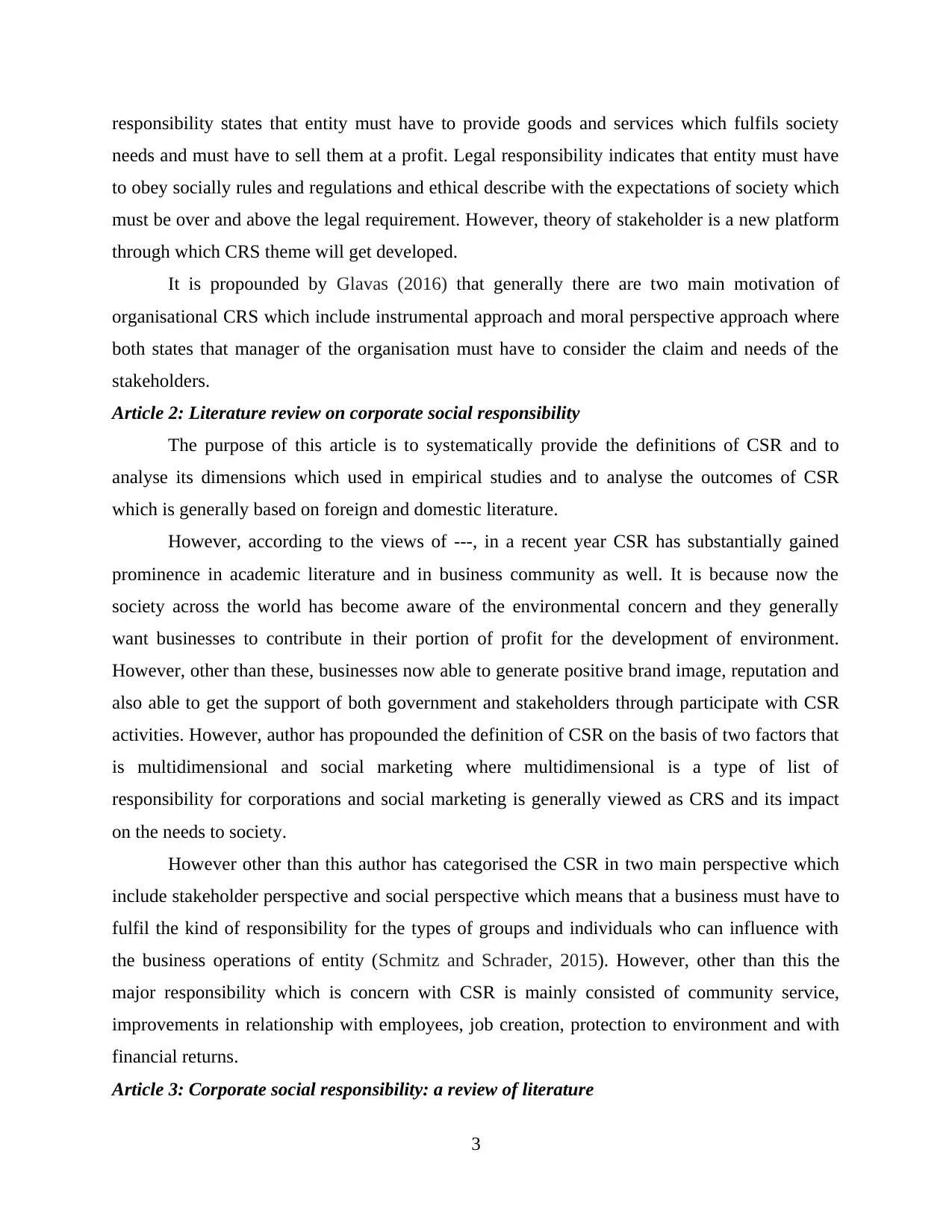
responsibility states that entity must have to provide goods and services which fulfils society
needs and must have to sell them at a profit. Legal responsibility indicates that entity must have
to obey socially rules and regulations and ethical describe with the expectations of society which
must be over and above the legal requirement. However, theory of stakeholder is a new platform
through which CRS theme will get developed.
It is propounded by Glavas (2016) that generally there are two main motivation of
organisational CRS which include instrumental approach and moral perspective approach where
both states that manager of the organisation must have to consider the claim and needs of the
stakeholders.
Article 2: Literature review on corporate social responsibility
The purpose of this article is to systematically provide the definitions of CSR and to
analyse its dimensions which used in empirical studies and to analyse the outcomes of CSR
which is generally based on foreign and domestic literature.
However, according to the views of ---, in a recent year CSR has substantially gained
prominence in academic literature and in business community as well. It is because now the
society across the world has become aware of the environmental concern and they generally
want businesses to contribute in their portion of profit for the development of environment.
However, other than these, businesses now able to generate positive brand image, reputation and
also able to get the support of both government and stakeholders through participate with CSR
activities. However, author has propounded the definition of CSR on the basis of two factors that
is multidimensional and social marketing where multidimensional is a type of list of
responsibility for corporations and social marketing is generally viewed as CRS and its impact
on the needs to society.
However other than this author has categorised the CSR in two main perspective which
include stakeholder perspective and social perspective which means that a business must have to
fulfil the kind of responsibility for the types of groups and individuals who can influence with
the business operations of entity (Schmitz and Schrader, 2015). However, other than this the
major responsibility which is concern with CSR is mainly consisted of community service,
improvements in relationship with employees, job creation, protection to environment and with
financial returns.
Article 3: Corporate social responsibility: a review of literature
3
needs and must have to sell them at a profit. Legal responsibility indicates that entity must have
to obey socially rules and regulations and ethical describe with the expectations of society which
must be over and above the legal requirement. However, theory of stakeholder is a new platform
through which CRS theme will get developed.
It is propounded by Glavas (2016) that generally there are two main motivation of
organisational CRS which include instrumental approach and moral perspective approach where
both states that manager of the organisation must have to consider the claim and needs of the
stakeholders.
Article 2: Literature review on corporate social responsibility
The purpose of this article is to systematically provide the definitions of CSR and to
analyse its dimensions which used in empirical studies and to analyse the outcomes of CSR
which is generally based on foreign and domestic literature.
However, according to the views of ---, in a recent year CSR has substantially gained
prominence in academic literature and in business community as well. It is because now the
society across the world has become aware of the environmental concern and they generally
want businesses to contribute in their portion of profit for the development of environment.
However, other than these, businesses now able to generate positive brand image, reputation and
also able to get the support of both government and stakeholders through participate with CSR
activities. However, author has propounded the definition of CSR on the basis of two factors that
is multidimensional and social marketing where multidimensional is a type of list of
responsibility for corporations and social marketing is generally viewed as CRS and its impact
on the needs to society.
However other than this author has categorised the CSR in two main perspective which
include stakeholder perspective and social perspective which means that a business must have to
fulfil the kind of responsibility for the types of groups and individuals who can influence with
the business operations of entity (Schmitz and Schrader, 2015). However, other than this the
major responsibility which is concern with CSR is mainly consisted of community service,
improvements in relationship with employees, job creation, protection to environment and with
financial returns.
Article 3: Corporate social responsibility: a review of literature
3
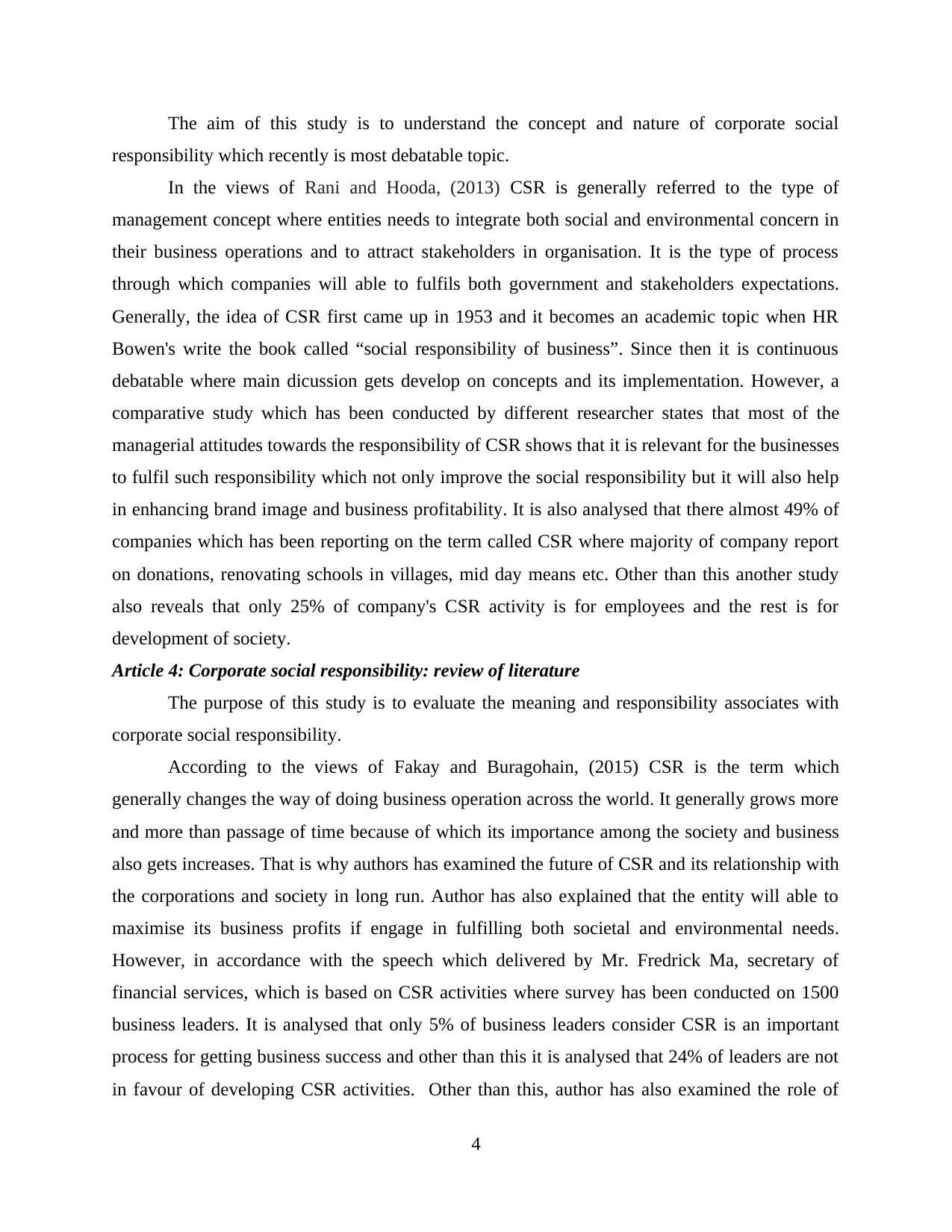
The aim of this study is to understand the concept and nature of corporate social
responsibility which recently is most debatable topic.
In the views of Rani and Hooda, (2013) CSR is generally referred to the type of
management concept where entities needs to integrate both social and environmental concern in
their business operations and to attract stakeholders in organisation. It is the type of process
through which companies will able to fulfils both government and stakeholders expectations.
Generally, the idea of CSR first came up in 1953 and it becomes an academic topic when HR
Bowen's write the book called “social responsibility of business”. Since then it is continuous
debatable where main dicussion gets develop on concepts and its implementation. However, a
comparative study which has been conducted by different researcher states that most of the
managerial attitudes towards the responsibility of CSR shows that it is relevant for the businesses
to fulfil such responsibility which not only improve the social responsibility but it will also help
in enhancing brand image and business profitability. It is also analysed that there almost 49% of
companies which has been reporting on the term called CSR where majority of company report
on donations, renovating schools in villages, mid day means etc. Other than this another study
also reveals that only 25% of company's CSR activity is for employees and the rest is for
development of society.
Article 4: Corporate social responsibility: review of literature
The purpose of this study is to evaluate the meaning and responsibility associates with
corporate social responsibility.
According to the views of Fakay and Buragohain, (2015) CSR is the term which
generally changes the way of doing business operation across the world. It generally grows more
and more than passage of time because of which its importance among the society and business
also gets increases. That is why authors has examined the future of CSR and its relationship with
the corporations and society in long run. Author has also explained that the entity will able to
maximise its business profits if engage in fulfilling both societal and environmental needs.
However, in accordance with the speech which delivered by Mr. Fredrick Ma, secretary of
financial services, which is based on CSR activities where survey has been conducted on 1500
business leaders. It is analysed that only 5% of business leaders consider CSR is an important
process for getting business success and other than this it is analysed that 24% of leaders are not
in favour of developing CSR activities. Other than this, author has also examined the role of
4
responsibility which recently is most debatable topic.
In the views of Rani and Hooda, (2013) CSR is generally referred to the type of
management concept where entities needs to integrate both social and environmental concern in
their business operations and to attract stakeholders in organisation. It is the type of process
through which companies will able to fulfils both government and stakeholders expectations.
Generally, the idea of CSR first came up in 1953 and it becomes an academic topic when HR
Bowen's write the book called “social responsibility of business”. Since then it is continuous
debatable where main dicussion gets develop on concepts and its implementation. However, a
comparative study which has been conducted by different researcher states that most of the
managerial attitudes towards the responsibility of CSR shows that it is relevant for the businesses
to fulfil such responsibility which not only improve the social responsibility but it will also help
in enhancing brand image and business profitability. It is also analysed that there almost 49% of
companies which has been reporting on the term called CSR where majority of company report
on donations, renovating schools in villages, mid day means etc. Other than this another study
also reveals that only 25% of company's CSR activity is for employees and the rest is for
development of society.
Article 4: Corporate social responsibility: review of literature
The purpose of this study is to evaluate the meaning and responsibility associates with
corporate social responsibility.
According to the views of Fakay and Buragohain, (2015) CSR is the term which
generally changes the way of doing business operation across the world. It generally grows more
and more than passage of time because of which its importance among the society and business
also gets increases. That is why authors has examined the future of CSR and its relationship with
the corporations and society in long run. Author has also explained that the entity will able to
maximise its business profits if engage in fulfilling both societal and environmental needs.
However, in accordance with the speech which delivered by Mr. Fredrick Ma, secretary of
financial services, which is based on CSR activities where survey has been conducted on 1500
business leaders. It is analysed that only 5% of business leaders consider CSR is an important
process for getting business success and other than this it is analysed that 24% of leaders are not
in favour of developing CSR activities. Other than this, author has also examined the role of
4
⊘ This is a preview!⊘
Do you want full access?
Subscribe today to unlock all pages.

Trusted by 1+ million students worldwide
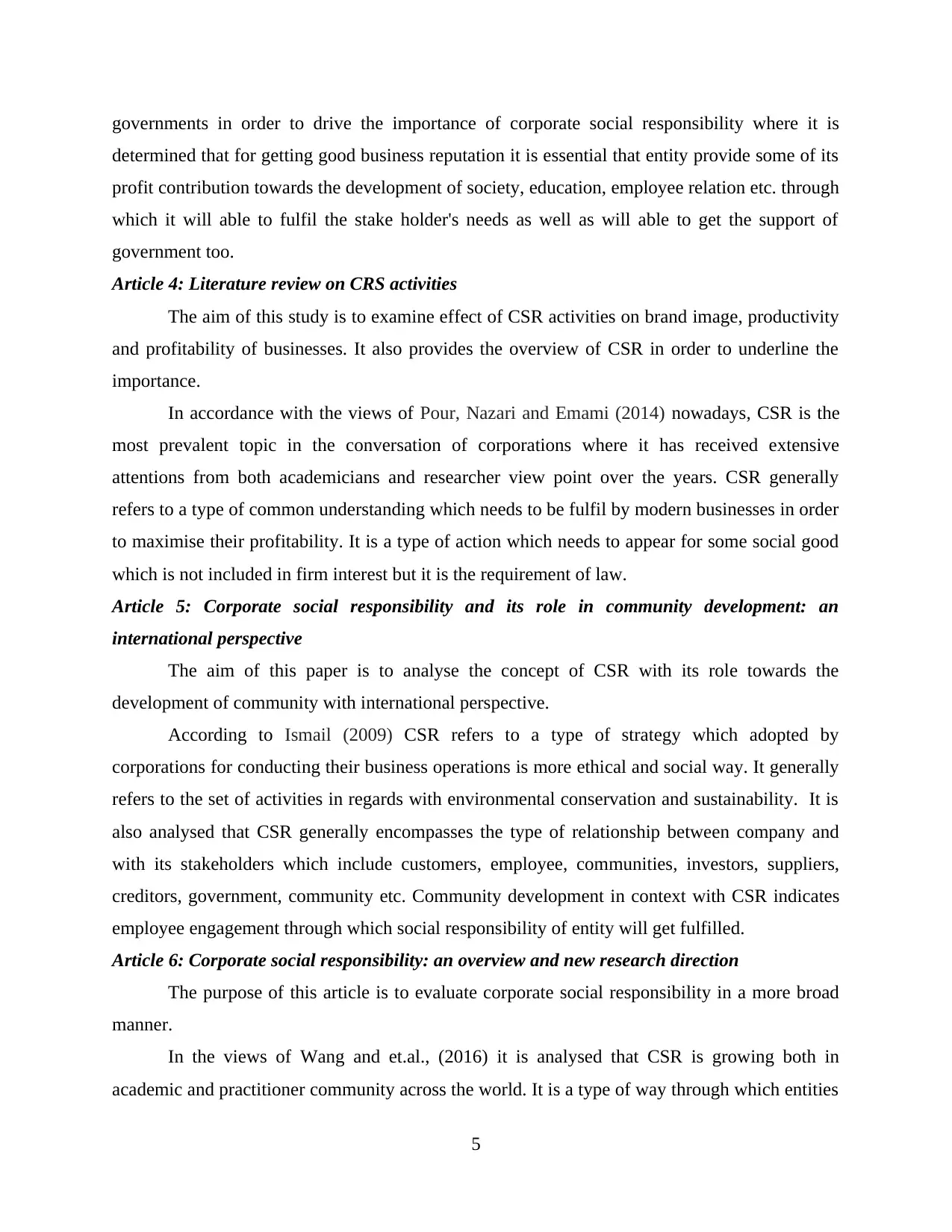
governments in order to drive the importance of corporate social responsibility where it is
determined that for getting good business reputation it is essential that entity provide some of its
profit contribution towards the development of society, education, employee relation etc. through
which it will able to fulfil the stake holder's needs as well as will able to get the support of
government too.
Article 4: Literature review on CRS activities
The aim of this study is to examine effect of CSR activities on brand image, productivity
and profitability of businesses. It also provides the overview of CSR in order to underline the
importance.
In accordance with the views of Pour, Nazari and Emami (2014) nowadays, CSR is the
most prevalent topic in the conversation of corporations where it has received extensive
attentions from both academicians and researcher view point over the years. CSR generally
refers to a type of common understanding which needs to be fulfil by modern businesses in order
to maximise their profitability. It is a type of action which needs to appear for some social good
which is not included in firm interest but it is the requirement of law.
Article 5: Corporate social responsibility and its role in community development: an
international perspective
The aim of this paper is to analyse the concept of CSR with its role towards the
development of community with international perspective.
According to Ismail (2009) CSR refers to a type of strategy which adopted by
corporations for conducting their business operations is more ethical and social way. It generally
refers to the set of activities in regards with environmental conservation and sustainability. It is
also analysed that CSR generally encompasses the type of relationship between company and
with its stakeholders which include customers, employee, communities, investors, suppliers,
creditors, government, community etc. Community development in context with CSR indicates
employee engagement through which social responsibility of entity will get fulfilled.
Article 6: Corporate social responsibility: an overview and new research direction
The purpose of this article is to evaluate corporate social responsibility in a more broad
manner.
In the views of Wang and et.al., (2016) it is analysed that CSR is growing both in
academic and practitioner community across the world. It is a type of way through which entities
5
determined that for getting good business reputation it is essential that entity provide some of its
profit contribution towards the development of society, education, employee relation etc. through
which it will able to fulfil the stake holder's needs as well as will able to get the support of
government too.
Article 4: Literature review on CRS activities
The aim of this study is to examine effect of CSR activities on brand image, productivity
and profitability of businesses. It also provides the overview of CSR in order to underline the
importance.
In accordance with the views of Pour, Nazari and Emami (2014) nowadays, CSR is the
most prevalent topic in the conversation of corporations where it has received extensive
attentions from both academicians and researcher view point over the years. CSR generally
refers to a type of common understanding which needs to be fulfil by modern businesses in order
to maximise their profitability. It is a type of action which needs to appear for some social good
which is not included in firm interest but it is the requirement of law.
Article 5: Corporate social responsibility and its role in community development: an
international perspective
The aim of this paper is to analyse the concept of CSR with its role towards the
development of community with international perspective.
According to Ismail (2009) CSR refers to a type of strategy which adopted by
corporations for conducting their business operations is more ethical and social way. It generally
refers to the set of activities in regards with environmental conservation and sustainability. It is
also analysed that CSR generally encompasses the type of relationship between company and
with its stakeholders which include customers, employee, communities, investors, suppliers,
creditors, government, community etc. Community development in context with CSR indicates
employee engagement through which social responsibility of entity will get fulfilled.
Article 6: Corporate social responsibility: an overview and new research direction
The purpose of this article is to evaluate corporate social responsibility in a more broad
manner.
In the views of Wang and et.al., (2016) it is analysed that CSR is growing both in
academic and practitioner community across the world. It is a type of way through which entities
5
Paraphrase This Document
Need a fresh take? Get an instant paraphrase of this document with our AI Paraphraser
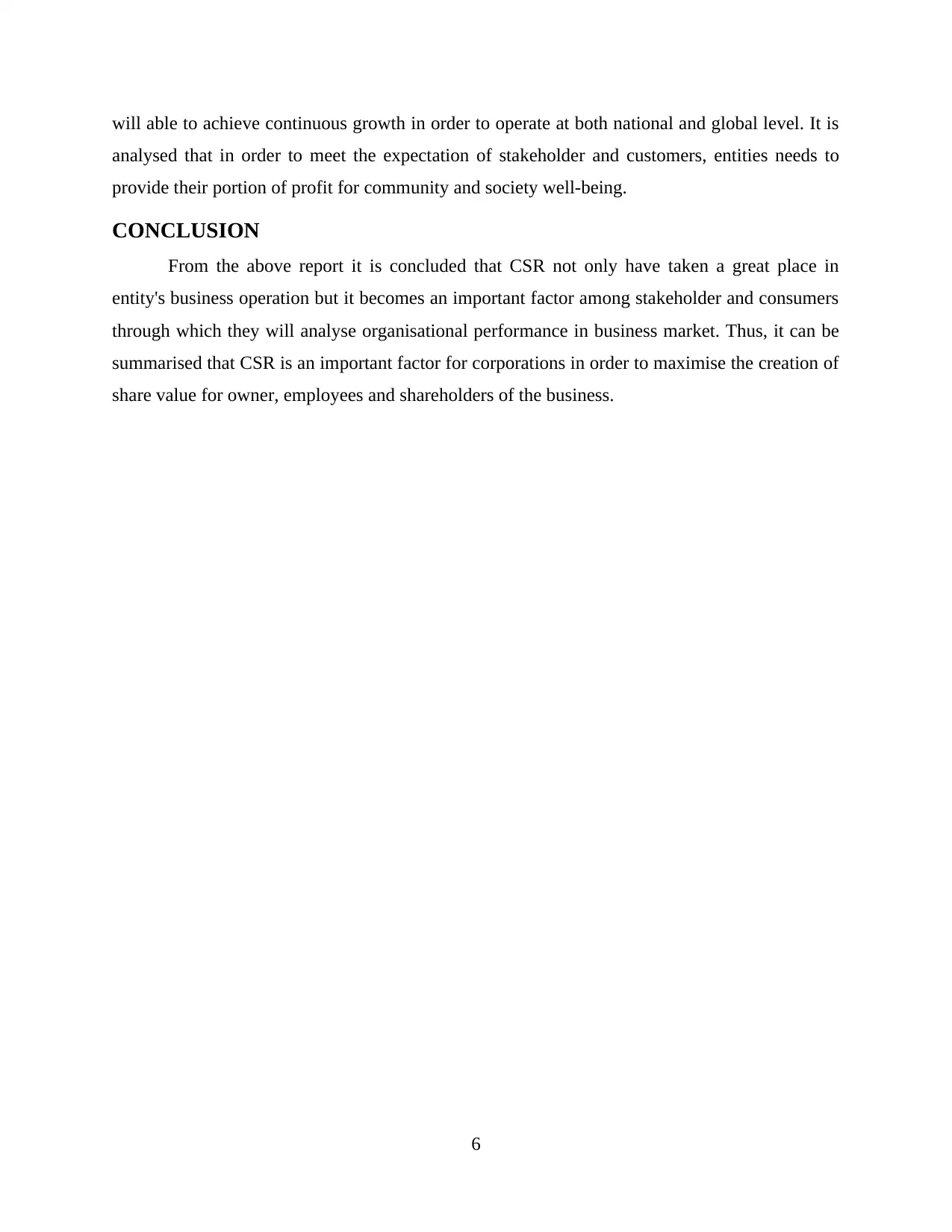
will able to achieve continuous growth in order to operate at both national and global level. It is
analysed that in order to meet the expectation of stakeholder and customers, entities needs to
provide their portion of profit for community and society well-being.
CONCLUSION
From the above report it is concluded that CSR not only have taken a great place in
entity's business operation but it becomes an important factor among stakeholder and consumers
through which they will analyse organisational performance in business market. Thus, it can be
summarised that CSR is an important factor for corporations in order to maximise the creation of
share value for owner, employees and shareholders of the business.
6
analysed that in order to meet the expectation of stakeholder and customers, entities needs to
provide their portion of profit for community and society well-being.
CONCLUSION
From the above report it is concluded that CSR not only have taken a great place in
entity's business operation but it becomes an important factor among stakeholder and consumers
through which they will analyse organisational performance in business market. Thus, it can be
summarised that CSR is an important factor for corporations in order to maximise the creation of
share value for owner, employees and shareholders of the business.
6
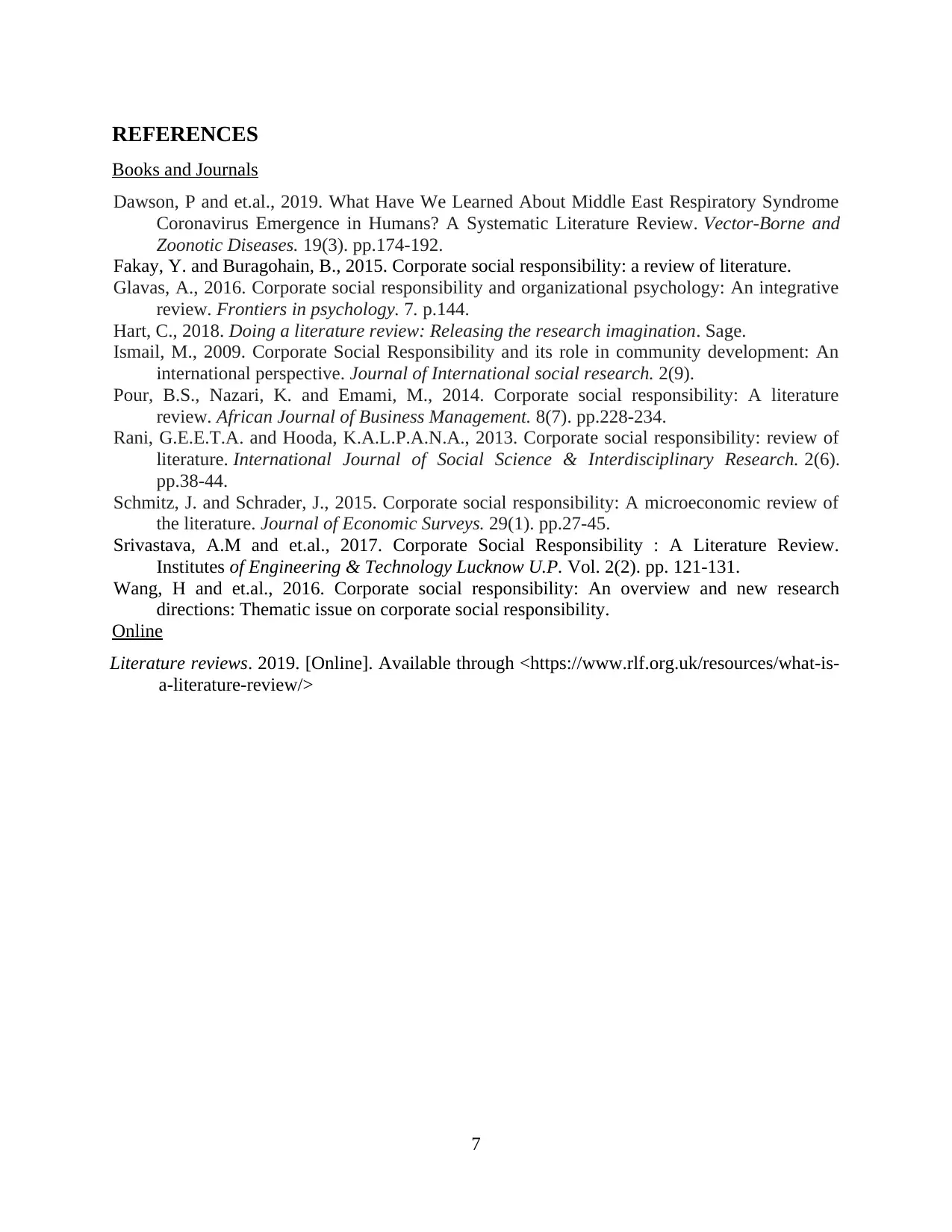
REFERENCES
Books and Journals
Dawson, P and et.al., 2019. What Have We Learned About Middle East Respiratory Syndrome
Coronavirus Emergence in Humans? A Systematic Literature Review. Vector-Borne and
Zoonotic Diseases. 19(3). pp.174-192.
Fakay, Y. and Buragohain, B., 2015. Corporate social responsibility: a review of literature.
Glavas, A., 2016. Corporate social responsibility and organizational psychology: An integrative
review. Frontiers in psychology. 7. p.144.
Hart, C., 2018. Doing a literature review: Releasing the research imagination. Sage.
Ismail, M., 2009. Corporate Social Responsibility and its role in community development: An
international perspective. Journal of International social research. 2(9).
Pour, B.S., Nazari, K. and Emami, M., 2014. Corporate social responsibility: A literature
review. African Journal of Business Management. 8(7). pp.228-234.
Rani, G.E.E.T.A. and Hooda, K.A.L.P.A.N.A., 2013. Corporate social responsibility: review of
literature. International Journal of Social Science & Interdisciplinary Research. 2(6).
pp.38-44.
Schmitz, J. and Schrader, J., 2015. Corporate social responsibility: A microeconomic review of
the literature. Journal of Economic Surveys. 29(1). pp.27-45.
Srivastava, A.M and et.al., 2017. Corporate Social Responsibility : A Literature Review.
Institutes of Engineering & Technology Lucknow U.P. Vol. 2(2). pp. 121-131.
Wang, H and et.al., 2016. Corporate social responsibility: An overview and new research
directions: Thematic issue on corporate social responsibility.
Online
Literature reviews. 2019. [Online]. Available through <https://www.rlf.org.uk/resources/what-is-
a-literature-review/>
7
Books and Journals
Dawson, P and et.al., 2019. What Have We Learned About Middle East Respiratory Syndrome
Coronavirus Emergence in Humans? A Systematic Literature Review. Vector-Borne and
Zoonotic Diseases. 19(3). pp.174-192.
Fakay, Y. and Buragohain, B., 2015. Corporate social responsibility: a review of literature.
Glavas, A., 2016. Corporate social responsibility and organizational psychology: An integrative
review. Frontiers in psychology. 7. p.144.
Hart, C., 2018. Doing a literature review: Releasing the research imagination. Sage.
Ismail, M., 2009. Corporate Social Responsibility and its role in community development: An
international perspective. Journal of International social research. 2(9).
Pour, B.S., Nazari, K. and Emami, M., 2014. Corporate social responsibility: A literature
review. African Journal of Business Management. 8(7). pp.228-234.
Rani, G.E.E.T.A. and Hooda, K.A.L.P.A.N.A., 2013. Corporate social responsibility: review of
literature. International Journal of Social Science & Interdisciplinary Research. 2(6).
pp.38-44.
Schmitz, J. and Schrader, J., 2015. Corporate social responsibility: A microeconomic review of
the literature. Journal of Economic Surveys. 29(1). pp.27-45.
Srivastava, A.M and et.al., 2017. Corporate Social Responsibility : A Literature Review.
Institutes of Engineering & Technology Lucknow U.P. Vol. 2(2). pp. 121-131.
Wang, H and et.al., 2016. Corporate social responsibility: An overview and new research
directions: Thematic issue on corporate social responsibility.
Online
Literature reviews. 2019. [Online]. Available through <https://www.rlf.org.uk/resources/what-is-
a-literature-review/>
7
⊘ This is a preview!⊘
Do you want full access?
Subscribe today to unlock all pages.

Trusted by 1+ million students worldwide
1 out of 9
Related Documents
Your All-in-One AI-Powered Toolkit for Academic Success.
+13062052269
info@desklib.com
Available 24*7 on WhatsApp / Email
![[object Object]](/_next/static/media/star-bottom.7253800d.svg)
Unlock your academic potential
Copyright © 2020–2026 A2Z Services. All Rights Reserved. Developed and managed by ZUCOL.





